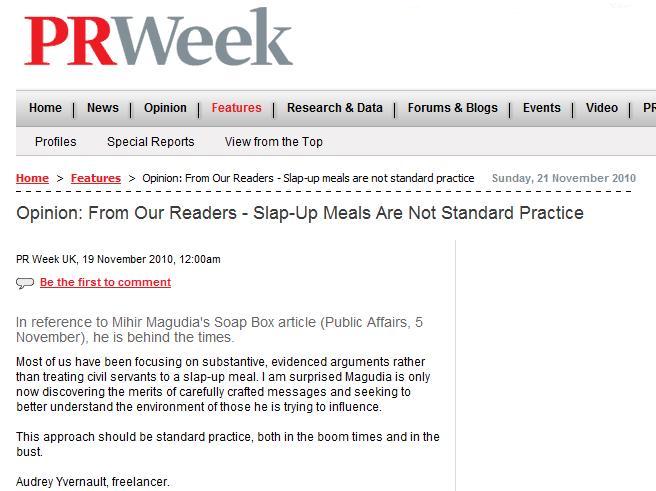This letter from me has been published in PR Week this week. It is in response to this 'soap box' in a previous issue.
Sunday, 21 November 2010
Monday, 15 November 2010
Wednesday, 10 November 2010
Good news for the sisterhood
It is good to see Cameron adding some more women to the list of Britain's business ambassadors (see list here at the FT). More recognition for such role models should help to encourage more women to reach the heights of the business world.
A former client of mine, an American businesswoman, told me that in the States successful women are called 'Sheroes'. I won't dwell on the irony of the name Hero being hijacked for use by men...
A former client of mine, an American businesswoman, told me that in the States successful women are called 'Sheroes'. I won't dwell on the irony of the name Hero being hijacked for use by men...
 |
| A shero? |
Sunday, 7 November 2010
Audrey recommends
A very good post by Iain Dale on how No.10 failed to media plan its big policy announcement on welfare this weekend.
I wonder if this is a result of poor management or a sign of the leadership's continued isolation from backbenchers?
I wonder if this is a result of poor management or a sign of the leadership's continued isolation from backbenchers?
Woolas and Election Campaigning
There seems to be some hand-wringing over at the FT that the way election campaigns are run will have to change significantly as a result of the court's decision that Phil Woolas is guilty of corrupt practices under the Representation of the People Act.
Contrary to being a 'bizarre' precedent, I think many in the business world, who must be honest with the City and consumers when trying to gain money (as dictated by laws and regulations galore), will find it amazing that politicians are not subject to similar restrictions when trying to gain votes.
Smears are nothing new, but I think it is entirely fair for politicians to be obliged not to deliberately lie about someone else's character. The idea that this is alright because it is 'normal practice' in politics does the business of politics no favours at all.
Not lying for personal advantage is a fairly basic starting point for ethical behaviour. Indeed, many industries have imposed such rules on themselves without needing an external body such as a court to make them do so. The communications industry and the pharmaceutical industry are two such that have Codes of Conduct promoting ethical practice, and the public affairs industry has just launched the UK Public Affairs Council to do the same.
To be clear, I don't mean my argument to apply to policy positions or promises, on which politicians must be allowed to alter their views. Governing is a reality which simply can't be prejudged and Parliamentary sovereignty means that Parliament cannot be bound by pre-election promises. The electorate are pretty savvy about this anyway, so I'm not sure people are really misled when a politician goes back on a policy pledge. Smearing your opponent is quite another matter - and outside election campaigns would be libel. Which begs the question - why should it be OK to libel someone in order to get yourself elected?
UPDATE: This article at Conservative Home confuses policy issues with the point of this judgement that campaigners can't lie about the other candidate: http://conservativehome.blogs.com/centreright/2010/11/robert-halfon-mp-the-implications-of-the-phil-woolas-case.html
UPDATE 2: The public agree with me (how gratifying!)
Contrary to being a 'bizarre' precedent, I think many in the business world, who must be honest with the City and consumers when trying to gain money (as dictated by laws and regulations galore), will find it amazing that politicians are not subject to similar restrictions when trying to gain votes.
Smears are nothing new, but I think it is entirely fair for politicians to be obliged not to deliberately lie about someone else's character. The idea that this is alright because it is 'normal practice' in politics does the business of politics no favours at all.
Not lying for personal advantage is a fairly basic starting point for ethical behaviour. Indeed, many industries have imposed such rules on themselves without needing an external body such as a court to make them do so. The communications industry and the pharmaceutical industry are two such that have Codes of Conduct promoting ethical practice, and the public affairs industry has just launched the UK Public Affairs Council to do the same.
To be clear, I don't mean my argument to apply to policy positions or promises, on which politicians must be allowed to alter their views. Governing is a reality which simply can't be prejudged and Parliamentary sovereignty means that Parliament cannot be bound by pre-election promises. The electorate are pretty savvy about this anyway, so I'm not sure people are really misled when a politician goes back on a policy pledge. Smearing your opponent is quite another matter - and outside election campaigns would be libel. Which begs the question - why should it be OK to libel someone in order to get yourself elected?
UPDATE: This article at Conservative Home confuses policy issues with the point of this judgement that campaigners can't lie about the other candidate: http://conservativehome.blogs.com/centreright/2010/11/robert-halfon-mp-the-implications-of-the-phil-woolas-case.html
UPDATE 2: The public agree with me (how gratifying!)
Friday, 5 November 2010
The LGA's bleeding stumps
 The Local Government Association is putting up vulnerable old people as the first to suffer from local council spending cuts, as reported by the BBC here.
The Local Government Association is putting up vulnerable old people as the first to suffer from local council spending cuts, as reported by the BBC here.The government provided an extra £2bn for social care by 2014-15 in the Spending Review, though there are fears that not all of it will reach the people who need it (if councils choose to spend it on other things).
A fairly clear 'bleeding stump' being proferred by the LGA and therefore I doubt they will have much luck with their campaign - it is too obvious.
However, I do wonder how much of the burden will end up on the NHS instead, which will be undergoing its massive transformation and unable to cope with such a significant additional demand. If I were the NHS Chief Exec, David Nicholson, I'd want a chat with the LGA...
Subscribe to:
Comments (Atom)


